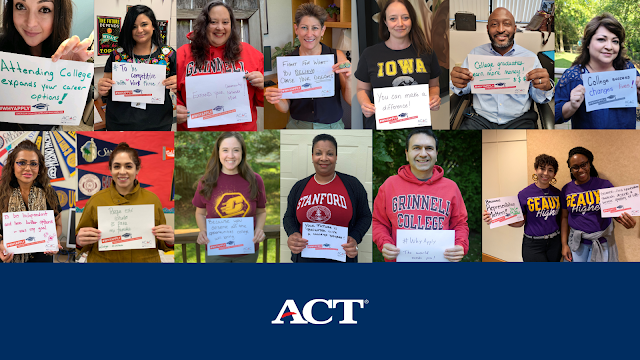Helping high school seniors move to the next stage in their lives requires more than individual motivation or support from their families. It can even take more than wise words from teachers and advisors. In fact, these very educators say that partners and community members from outside of high schools make a big difference.
Many winners of the third annual School of Excellence awards, an initiative of the American College Application Campaign (ACAC) that honors schools across the country for helping students pursue postsecondary success, engaged and leveraged external groups to improve the reach of their programs.
For instance, Woodhaven High School college advisor Zariea Williams in Flat Rock, Michigan, is extremely proud of her school’s Senior Set-Up event. During the gathering, approximately 100 seniors created their Federal Student Aid IDs and started filling out the Free Application for Federal Student Aid (FAFSA) form. The school hosts the event in partnership with financial aid office representatives from nearby Oakland University.
“We walked seniors step by step through applying to a local college, sending their transcripts, and discussing financial aid,” Williams said. “This helped promote and maintain momentum during Michigan College Month and the following months. A high school can expand its resources and have expert support by partnering with a university's financial aid or admissions office to host an event like Senior Set-Up or on-site admissions.”
In Washington, D.C., Coolidge Senior High School partners with the District of Columbia College Access Program and the Latino Student Fund Listo Program. These groups provide additional resources and support because, College and Career Coordinator Symphoni Henry says, “All students, regardless of socioeconomic status, color, income, or ethnicity, deserve access and opportunity to secure a quality postsecondary future.”
Not all external partners work in the education field. Crooksville High School in central Ohio asks its alumni to return to their old stomping grounds to help seniors understand the value of making a plan.
“It’s awesome to see the wealth of knowledge that develops when there are so many stakeholders at the same table,” GEAR Up advisor Jenny Johnson said.
School counselor Erica Hampton at Liberty High School in Glen Daniel, West Virginia, echoed that sentiment.
“Be proactive in scheduling presenters, don't be afraid to try activities, and use your community resources,” she said. “Remember that not all students are four-year college-bound, and that trade schools and certificate programs are wonderful opportunities to be successful.”
School counselor Erica Hampton, dressed as a veterinarian, and student Brooklyn Scarbro, dressed as an EMT, strike a pose after Brooklyn completed her FAFSA during their school's College Theme Week. (Credit: Liberty High School)
Besides helping more seniors to be college- and career-ready, involving the community has an added benefit, noted Tori Adams, a school counselor at Andalusia High School in southern Alabama.
“You’ll also bring awareness of your school counseling program and the many services provided to students,” she said. “We invited recruiters to speak to students, helped students complete their applications, hosted FAFSA nights for parents, and celebrated with an ‘I Applied Day’ on the front lawn of the school with school and community leaders.”
In Kansas, Wichita High School East achieved schoolwide participation in its initiatives, with more than 400 seniors taking part. Educators credit community support for making it work, including participation from employers in the aerospace, aviation, and construction industries, as well as the Army and Army National Guard, Air Force, Air National Guard, and Marine Corps.
These School of Excellence award winners took different approaches, but by opening their doors to others, motivated seniors and helped them understand all of their postsecondary options.

